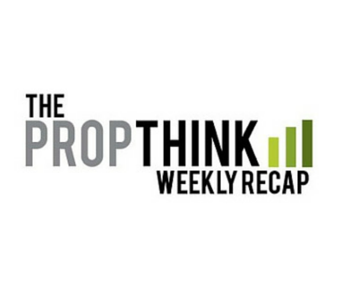No one has the exact answer, but Mr. King’s post-JP Morgan musings from earlier this year seem relevant yet again. As of Friday’s close, the S&P 500 is actually down year-to-date, while the biotechnology sector is up an impressive 14%, as measured by the IBB. The two have clearly diverged, and it almost seems that investors are fleeing to biotechnology for safety. That’s quite a departure from years past.

On Monday we published a long-form look at SAGE Therapeutics (SAGE) and Marinus Pharmaceuticals (MRNS), explaining to PropThink subscribers why investors in either one can’t ignore the other. These two companies are developing drug candidates with a novel mechanism for the treatment of epilepsy. While many existing anti-epilepsy drugs potentiate synaptic GABA receptors, SAGE and MRNS’ allopregnanolone and ganaxolone, respectively, also target these receptors extrasynaptically. Read SAGE and Marinus: Can’t Look at One without the Other at PropThink.com.
This week in healthcare was marked by a number of negative events among the small-caps. First, AcelRx (ACRX) reported on Monday that the FDA wants another clinical study of the company’s Zalviso patient-controlled analgesic device prior to re-considering its approval. The system was rejected in July of 2014, but the company has said with confidence in the half-year since that they would not need to run another clinical trial prior to resubmitting the marketing application to the FDA, which was planned for this quarter. According to the company, the FDA’s original requests included data demonstrating a reduction in the incidence of system errors; changes to the device’s Instructions for Use; and additional data to support the Zalviso nanotab’s shelf life. Now, the FDA wants another study. AcelRx excutives on a conference call Monday seemed as stunned as investors, and the stock fell from $9 to $4 by the end of the week.
In a similar situation is Acadia Pharmaceuticals (ACAD), which on Wednesday said that its own planned New Drug Application filing would be delayed until later this year. Acadia has taken a remarkably long time to prepare the NDA for NUPLAZID (pimavanserin) and blames the latest delay on “additional time required to complete the preparation of systems to support commercial manufacturing and supply and, in turn, to support the U.S. Food and Drug Administration’s (FDA) review of NUPLAZID.” According to the company, the delay is not a result of any change to NUPLAZID’s clinical or safety profile, “nor is it a result of any interaction with or request for information from the FDA.” Investors weren’t pleased, and the stock fell to $34 from a high of $45 early this week. Adding to the confusion and frustration, long-time Acadia CEO Uli Hacksell announced his resignation the same afternoon.
With both ACRX and ACAD, the sense among healthcare investors is that these executives may be as lost as their investors.
Despite press releases expounding “positive” results from their respective clinical studies, CTI Biopharma (CTIC) and Neuralstem (CUR) both sold off hard this week. In a nutshell, a mid-stage study of Neuralstem’s surgical stem cell therapy, NSI-566, in amyotrophic lateral sclerosis (ALS) provided little in the way of conclusive results. The use of a responder analysis raised as many questions as it answered, and details were sparse until slides from a presentation trickled out later in the day. CUR lost 30% into the end of the week. CTIC, meanwhile, lost the same this week as details emerged from its own phase 3 trial of pacritinib, a Janus kinase inhibitor, in myelofibrosis. According to a company press release, patients receiving pacritinib demonstrated a higher rate of spleen response compared to best alternative therapy in the PERSIST-1 study, and that the difference was statistically significant. The company also said that the response rate was consistent with results from other studies. Days later, it became clear that pacritinib may not be as active as hoped: the spleen response rate with pacritinib was 19.1% compared to 4.7% for best alternative therapy in the study. Compared to Incyte’s (INCY) Jakafi at a spleen response rate of over 30% in late-stage trials, pacritinib does’t look so hot, and that’s a far cry from the 27% seen in a previous phase 2 study.
At mid-week we put together an update on Synergy Pharmaceuticals (SGYP) as the completion of the first phase 3 trial testing plecanatide in constipation approaches in the second quarter. Notably, the trial (and an identical study completing in the third quarter) tests two doses, 3mg and 6mg, of plecanatide. Read the article to understand what investors will be looking for with the forthcoming results; why the 6mg dose is important; and when we expect the results.
Also, try our premier newsletter, PropThink Premium for one month for just $49. Our contributors provide fundamental and independent research on emerging-growth healthcare companies, and we’re always looking for the next big idea.



